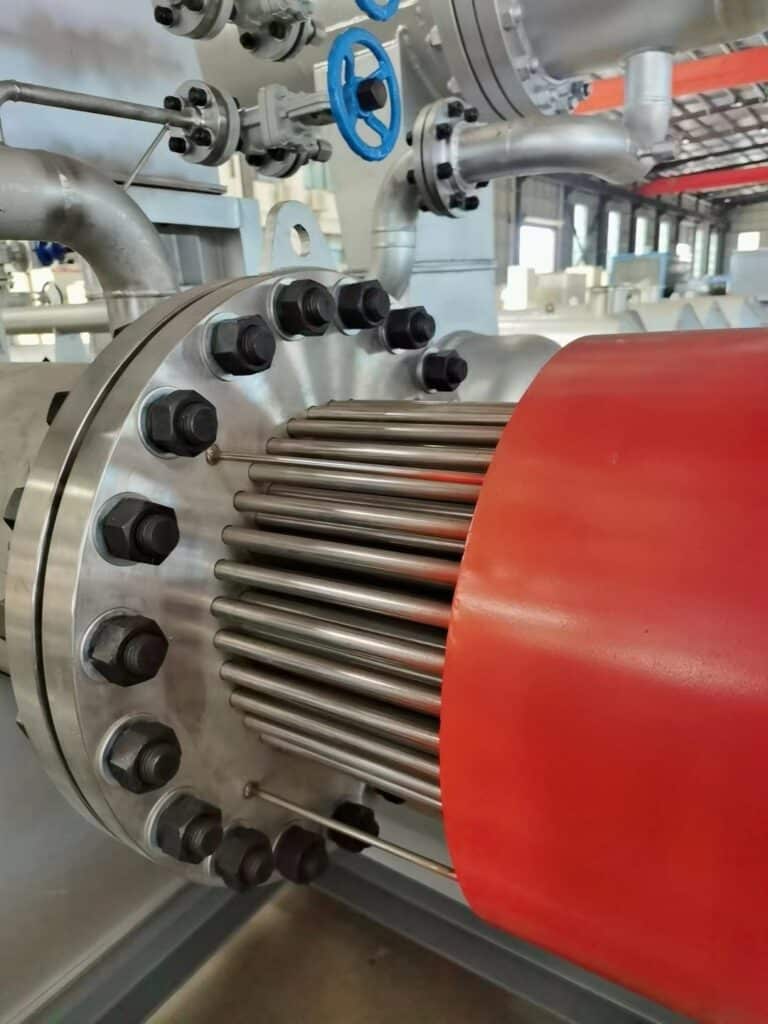When choosing between a thermal oil boiler and a steam boiler, it is vital to understand their key differences in order to select the right system. Although both are used to heat and transfer heat, they differ significantly in design, operating principles and range of application.

Comparison of characteristics
| characterisation | Thermal oil boiler | steam boiler |
|---|---|---|
| work pressure | atmospheric pressure | oppressive |
| temperature range | Up to 400°C | constrained by pressure |
| efficiency | high | moderate |
| Maintenance requirements | relatively low | high |
| Application Flexibility | your (honorific) | constraints |
Key differences between thermal oil boilers and steam boilers
1. work pressure::
Thermal oil boilers typically operate at atmospheric pressure, which means they do not need to withstand high-pressure environments. In contrast, steam boilers need to operate at high pressures to produce steam, which increases equipment and maintenance requirements. The non-pressurised operation of thermal oil boilers reduces operational risks and safety hazards.
2. temperature range::
Heat transfer oil boilers have a wide temperature range and can heat heat carrier oil up to 400°C, making them suitable for applications requiring high temperature heating. Steam boilers, on the other hand, are limited in temperature by their operating pressure, which usually cannot exceed 300°C. Therefore, thermal oil boilers have a greater advantage in certain high temperature processes.
3. efficiency::
Heat transfer oil boilers typically have higher thermal efficiency. Because heat carrier oil can operate consistently over a wider temperature range and does not require high pressure steam, it can transfer heat more efficiently. In contrast, steam boilers are less efficient and may waste more energy due to the pressure limitations of the steam.
4. Maintenance requirements::
Because thermal oil boilers operate at atmospheric pressure, they have relatively low maintenance needs. The lower pressure of the system reduces many of the maintenance issues associated with high pressure steam boilers. Steam boilers, on the other hand, require more frequent inspections and maintenance, and high-pressure boilers in particular require special attention to the safety of boiler pipework and the risk of steam leakage.
5. Application Flexibility::
Thermal oil boilers are used in a wide range of fields such as chemicals, food processing, pharmaceuticals, etc. due to their extensive temperature control capabilities and efficient heat transfer. Steam boilers, on the other hand, are mainly used in processes that require steam, such as heating and steam-driven machinery, and therefore have a relatively narrow field of application.
Coal-fuelled thermal oil boilers: efficiency and sustainability
Coal-fuelled thermal oil boilers are still an affordable option in some areas, especially those industries with abundant coal resources. Despite the environmental concerns associated with coal combustion, the sustainability of these systems has improved with advances in clean coal technology.
dominance
- cost-effectiveness: Coal is usually cheaper than oil or natural gas, so in areas where coal is abundant, a coal thermal oil boiler can significantly reduce operating costs. The low cost of coal is an important factor in many industries choosing coal boilers.
- high heat output: Coal thermal oil boilers are capable of delivering a powerful heat output and are ideally suited for large-scale heating applications such as industrial heating and centralised heating systems. Their consistently high heat output can meet the demands of large-scale production processes.
- resource-rich: Coal resources are relatively abundant globally, especially in regions that are dependent on coal for energy, and the use of coal boilers can both secure energy supply and reduce procurement costs.
challenge
- Emissions issues: Coal combustion produces pollutants such as carbon dioxide and sulphide, which requires coal boilers to be equipped with advanced desulphurisation and denitrification equipment as well as filtration systems to meet environmental emission standards. Environmental pressures make the operation of coal boilers more challenging.
- Maintenance requirements: Coal boilers require regular de-ashing and flue cleaning to deal with slag and ash build-up. These additional maintenance tasks increase boiler operating costs and labour maintenance requirements.
Applicable industries
- Chemical industry: Coal-fuelled thermal oil boilers can provide a stable source of high-temperature heat for chemical processes, especially where high heat is required and continuous production takes place.
- Oil and gas: Coal thermal oil boilers are used to provide efficient, continuous heat in oil refining and natural gas processing.
- food processing: Particularly in food production processes that require large-scale heating and drying, the high heat output of coal boilers can be effective in increasing productivity.
By choosing the right type of boiler and fuel, businesses can minimise operating costs and increase productivity while safeguarding their energy supply.
Our company can non-standard custom products, click the menu bar to contact us to customise, you can also refer to the first!product pageAppreciate our company's products oh!
Recommended Reading:
